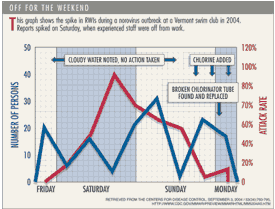Like many leisure pursuits, most aquatics activities take place outside of banker’s hours (Monday through Friday, 9 a.m. to 5 p.m.). Yet just when their facility’s attendance is peaking, many operators give time off to themselves and their most experienced staffers. In an age when facilities are increasingly battling recreational water illnesses, this practice is not only bad for public health, but also business as a whole.
Already, the Centers for Disease Control in Atlanta have noted a correlation between a spike in RWIs and weekends. The reason is obvious: Without the same level of protection and oversight of someone who understands the pump room and the associated issues related to water chemistry or filtration systems, things can — and do — go wrong.
Aquatics professionals aren’t the only ones at fault. Health officers who regulate pool and spa environments also perform their duties for the most part during the business week, again on banker’s hours. Reviewing pool chemical records after the fact only provides evidence of noncompliance with disinfection and pH standards (the most common pool code violations in the nation).
As we have become all too aware due to recent outbreaks, without proper water chemistry, aquatics facilities can quickly become breeding grounds for disease. And increasingly, the public is fighting back with costly lawsuits.
If we hope to change this trend and gain back the public trust, we must be more diligent in protecting guests.
An important first step would be ensuring that a water-quality expert is on duty evenings and weekends. A weekend norovirus outbreak at a Vermont swim club in 2004 shows a typical scenario.
“Interviews with swimmers and staff indicated that the water was visibly cloudy throughout Saturday and on Sunday morning, when the regular maintenance person was not on duty and pool usage was the highest,” according to the CDC report about the incident.
The weekend outbreak sickened more than 50 patrons. It was later discovered that the chlorine feeder tube got kinked and wasn’t fixed until Monday, the report said.
This situation is all too common at facilities across the nation. Whether it’s water quality, chlorine levels or filtration problems, conditions such as those in the Vermont case go unaddressed unless a knowledgeable operator and staffer are around.
By leaving evening and weekend water quality to chance, the chemical controller or an untrained employee only increase the exposure of the swimming public to RWIs.
Having experienced operators present during peak facility usage is essential to solving the problem. But doing so will require a financial and operational commitment on the part of operators, and a change of culture within the broader aquatics community.



